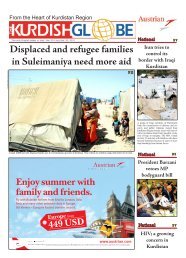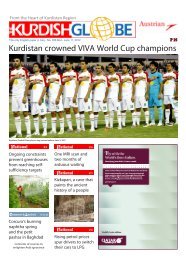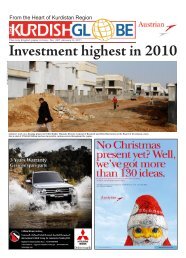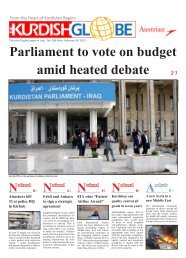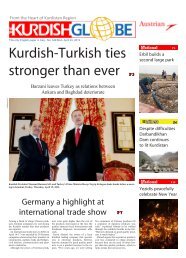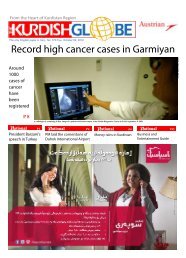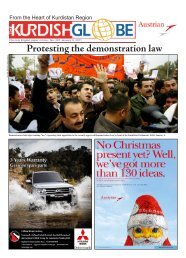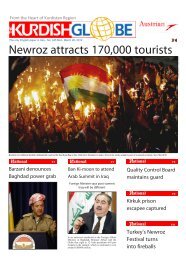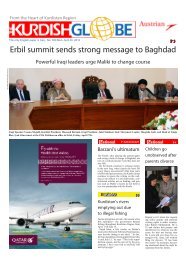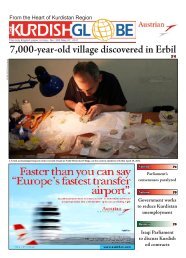KDP confirms government rotation - Kurdish Globe
KDP confirms government rotation - Kurdish Globe
KDP confirms government rotation - Kurdish Globe
Create successful ePaper yourself
Turn your PDF publications into a flip-book with our unique Google optimized e-Paper software.
The <strong>Kurdish</strong> <strong>Globe</strong> No. 335, Saturday, January 07, 2012 12<br />
As currency<br />
PRESS PHOTO<br />
crisis and feud<br />
with West<br />
deepen,<br />
Iranians brace<br />
for war<br />
At a time when U.S. officials<br />
are increasingly confident that<br />
economic and political pressure<br />
alone may succeed in curbing<br />
Iran’s nuclear ambitions, the<br />
mood here has turned bleak<br />
and belligerent as Iranians prepi<br />
pare grimly for a period of proli<br />
longed hardship and, they fear,<br />
war.<br />
This stark contrast has been<br />
evident in the Iranian capiti<br />
tal this week as a top military<br />
commander declared a “critici<br />
cal point” in the country’s long<br />
feud with the West and ordinary<br />
Iranians stocked up on essential<br />
supplies. Merchants watched<br />
helplessly as the Iranian curri<br />
rency, the rial, shed more than<br />
a third of its value, triggering<br />
huge increases in the prices of<br />
imported goods.<br />
“I will tell you what this is<br />
leading to: war,” said a merci<br />
chant in Tehran’s popular<br />
Paytakht bazaar who gave his<br />
name only as Milad. “My fami<br />
ily, friends and I — we are all<br />
desperate.”<br />
The sense of impending confi<br />
frontation is not shared in<br />
Washington and other Western<br />
capitals, where <strong>government</strong> offi<br />
ficials and analysts expressed<br />
cautious satisfaction that their<br />
policies are working.<br />
Former and current U.S. govei<br />
ernment officials did not dismi<br />
miss the possibility of a militi<br />
tary confrontation but said they<br />
saw recent threats by Iranian<br />
leaders — including warning a<br />
U.S. aircraft carrier this week<br />
not to return to the crucial Strait<br />
of Hormuz — mainly as signs<br />
of rising frustration. U.S. offici<br />
cials say this amounts to vindici<br />
cation of a years-long policy of<br />
increasing pressure, including<br />
through clandestine operations,<br />
on Iran’s clerical rulers without<br />
provoking war.<br />
“The reasons you’re seei<br />
ing the bluster now is because<br />
they’re feeling it,” said Dennis<br />
Ross, who was one of the White<br />
House’s chief advisers on Iran<br />
before stepping down late last<br />
year. With even tougher sancti<br />
tions poised to take effect in<br />
weeks, the White House had<br />
succeeded in dramatically raisi<br />
ing the costs of Iran’s nuclear<br />
program, he said.<br />
“The measure, in the end, is,<br />
‘Do they change their behavi<br />
ior?’ ” Ross said.<br />
The Obama administration<br />
is readying new punitive measi<br />
sures targeting the Central<br />
Bank of Iran, while leaders<br />
of the European Union took a<br />
step this week toward approvi<br />
ing strict curbs on imports of<br />
Iranian petroleum in hopes of<br />
pressuring the nation to abandi<br />
don what they say is a drive to<br />
develop nuclear weapons. Iran<br />
says its nuclear program is for<br />
peaceful energy production.<br />
State<br />
Department<br />
spokes¬woman Victoria Nuli<br />
land deemed as “very good<br />
news” the E.U.’s commitment<br />
to shutting off the flow of Irani<br />
nian oil to Europe.<br />
“This is consistent with tightei<br />
ening the noose on Iran econi<br />
nomically,” Nuland told reportei<br />
ers Wednesday. “We think that<br />
the place to get Iran’s attention<br />
is with regard to its oil sector.”<br />
In Tehran, that tightening is<br />
being felt by millions of peopi<br />
ple. Economists and independi<br />
dent analysts say the sanctions<br />
have aggravated the country’s<br />
chronic economic problems<br />
and fueled a currency crisis that<br />
is limiting the availability of a<br />
broad array of goods, including<br />
illegally imported iPhones and<br />
life-saving medicines.<br />
While dollar injections by the<br />
Central Bank of Iran in recent<br />
days appeared to stabilize the<br />
rial, foreign-exchange traders<br />
said Wednesday that they were<br />
not selling dollars because the<br />
rate set by the bank was “artifi<br />
ficial.”<br />
Iranian President, Mahmoud Ahmadinejad, faces turmoil both internally and with the international community.<br />
In a move that underscored a<br />
lack of options in quelling the<br />
currency crisis, Iranian authoriti<br />
ties resorted to ordering money<br />
changers to post much lower<br />
exchange rates for dollars in<br />
their shop windows Wednesdi<br />
day. Authorities also blocked<br />
Web sites that listed real-time<br />
rates, according to Khabaronli<br />
line, a Web site critical of the<br />
<strong>government</strong>.<br />
In Tehran, where public suppi<br />
port for the <strong>government</strong> has<br />
dwindled since it cracked down<br />
on large opposition protests in<br />
2009, many blame Iran’s leadei<br />
ers and their policies for the<br />
sanctions, as well as for the<br />
country’s increasing internati<br />
tional isolation and tensions<br />
with the United States.<br />
Economists and businessmen<br />
say that after years of erratic<br />
economic policies by the govei<br />
ernment of President Mahmoud<br />
Ahmadinejad, each new round<br />
of sanctions aimed at Iran’s key<br />
oil income increases fears of an<br />
overall economic meltdown.<br />
“It’s basic economic law,”<br />
said Jamshid Edalatian, a reti<br />
tired professor of economics,<br />
former banker and member of<br />
Iran’s chamber of commerce.<br />
“When people start worrying<br />
about the future, they start buyi<br />
ing strong currencies to use in<br />
difficult times, and right now<br />
everybody is baffled and confi<br />
fused over the future.”<br />
Confusion abounded this<br />
week in the Paytakht shopping<br />
center, which is Tehran’s main<br />
computer bazaar. The price of<br />
the Apple iPhone 4S, reexportei<br />
ed from nearby Dubai, United<br />
Arab Emirates, and highly<br />
prized by many young Iraniai<br />
ans, had surged, like most other<br />
imported products. The phone<br />
now costs 35 percent more.<br />
The money changer involved<br />
in most of the merchants’ purci<br />
chases from Dubai also had<br />
disappeared with more than<br />
a million of their dollars after<br />
the rial suddenly collapsed.<br />
“Nobody is buying or selling,”<br />
said Nader Kamali, who owns<br />
a cellphone shop. “How can we<br />
live like this?”<br />
The pain extends to the counti<br />
try’s large industries. Accordi<br />
ing to the Iranian Labor News<br />
Agency, high prices for commi<br />
modities and raw materials,<br />
caused by the rial’s plunge, have<br />
led to the closure of 50 percent<br />
of businesses in the biggest indi<br />
dustrial zone near Tehran.<br />
The rial slid as the governmi<br />
ment ended another year of reci<br />
cord oil sales that have brought<br />
in nearly $500 billion over five<br />
years. Authorities have sought<br />
to distribute some of the wealth,<br />
bringing liquidity to unprecei<br />
edented levels.<br />
Ahmadinejad has allowed<br />
domestic energy prices to rise<br />
and ended massive state subsi<br />
sidies. But, at the same time,<br />
he has sought to ease the pain<br />
through direct state aid, paying<br />
60 million Iranians nearly $40<br />
a month.<br />
The moves have spurred inflati<br />
tion over the past year, raising<br />
the prices of food, rent, utiliti<br />
ties and highway tolls, squeezi<br />
ing the average urban family’s<br />
monthly income of about<br />
$550.<br />
Edalatian, the economist,<br />
called for harsh measures to<br />
weather the storm caused by the<br />
sanctions and erratic governmi<br />
ment policies. He said the govei<br />
ernment should restrict nonessi<br />
sential imports such as cars and<br />
televisions and take over the<br />
foreign-currency market.<br />
“More sanctions are comi<br />
ing,” he said. “We must be prepi<br />
pared.”<br />
Among those complaining<br />
about the rial’s drop were prodi<br />
ducers of medicine, importers<br />
of foreign cars and food, and<br />
truck drivers on international<br />
routes. In some cases, they deci<br />
cided to stop working because<br />
they could no longer make a<br />
profit.<br />
Siavash Saadat said he did not<br />
know how he was going to pay<br />
for the goods he ordered from<br />
India for his Mina pharmaceuti<br />
tical factory.<br />
“We either have to close down<br />
or I will be forced to lay off<br />
workers,” he said.<br />
Warrick reported from Washi<br />
ington. Special correspondents<br />
Somaye Malekian and Ramtin<br />
Rastin contributed to this repi<br />
port.<br />
By Thomas Erdbrink and Joby Warrick<br />
for The Washington Post



